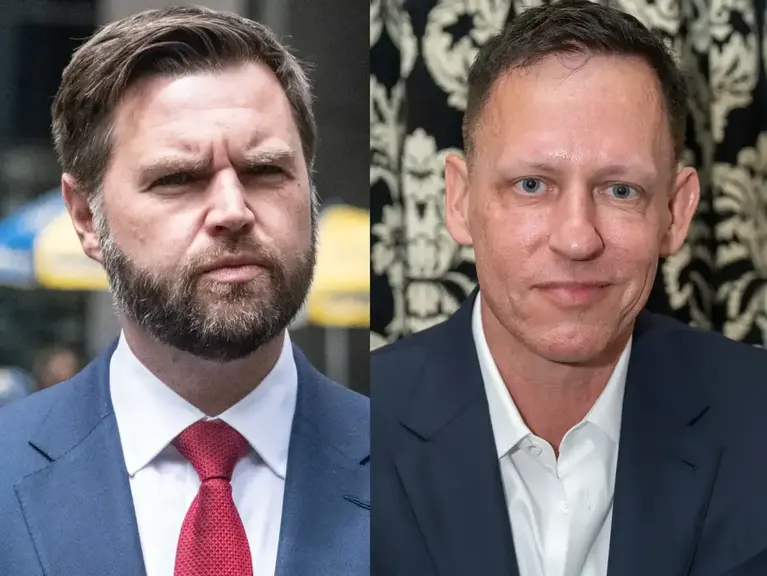In the ever-evolving landscape of American politics, few figures are as enigmatic and influential as Peter Thiel. The billionaire venture capitalist, co-founder of PayPal, and early Facebook investor has wielded his wealth and intellect to shape the political direction of the United States. Once a vocal supporter of Donald Trump’s 2016 campaign, Thiel has continued to exert influence in conservative circles, particularly through his financial backing of rising political figures such as J.D. Vance, who was selected as Trump’s running mate for the 2024 election.
Yet, Thiel remains an enigmatic figure—both a tech visionary and an ideological enigma. Known for his deeply libertarian and conservative views, he has openly criticized democracy, embraced the philosophy of political philosopher Leo Strauss, and championed technological advancements with an almost messianic fervor. As the political landscape in America continues to shift under Trump’s second presidency, many are left wondering: What does Peter Thiel want? And how does his vision for technology, governance, and society shape the future of the United States?
The Rise of Peter Thiel: Tech Entrepreneur to Political Kingmaker
Peter Thiel’s journey began with immense success in Silicon Valley. After co-founding PayPal and investing early in Facebook, he built a reputation as a sharp investor and contrarian thinker. His role in backing Elon Musk’s Tesla and other tech ventures solidified his position as a major force in Silicon Valley. Yet, while many in the tech world leaned left politically, Thiel’s ideological path took a different turn.
Unlike many of his Silicon Valley peers, Thiel emerged as a conservative libertarian, advocating for free markets, minimal government intervention, and an almost utopian faith in technological progress. His involvement in politics was cemented when he became one of Trump’s most high-profile supporters in 2016, making him a rare and controversial figure in an otherwise liberal-dominated industry.
The Thiel-Vance Political Connection
Thiel’s influence in Trump’s orbit is perhaps best exemplified by his support for J.D. Vance, a former venture capitalist-turned-politician from Ohio. Vance’s transformation from a skeptic of Trump—once comparing him to Hitler—to an ardent supporter underscores the fluidity of ideological alliances in contemporary American politics. His close relationship with Thiel, who provided substantial funding for Vance’s Senate campaign, ultimately contributed to his selection as Trump’s running mate in the 2024 election.
This maneuver placed Thiel directly in the heart of Washington’s political machinery. Thiel’s backing of Vance signals his continued influence within the Republican Party and his belief that a new era of governance, shaped by technological elites and economic populism, is on the horizon.
The Straussian Lens: Is America Facing Its ‘Moment of Death’?
One of Thiel’s most intriguing intellectual contributions is his essay, The Straussian Moment. Although the essay is difficult to access in a widely published format, it has become an important text in conservative intellectual circles. Thiel, heavily influenced by political philosopher Leo Strauss, has argued that modern liberal democracy is unsustainable and that political upheaval is inevitable.
Strauss, a philosopher whose work emphasized the importance of classical political philosophy, believed that modernity was leading humanity astray. He warned that societies that embraced relativism and rejected absolute truths would eventually crumble, leading to what he called a “moment of death.” Thiel’s interest in Strauss, along with the work of philosopher René Girard, suggests that he sees the technological and social crises of today as signs that the current order is eroding.
Given his skepticism of democracy’s effectiveness in fostering progress, Thiel’s support for figures like Trump and Vance raises the question: Is he attempting to usher in a new era of technological dominance, where progress is guided by an elite technocracy rather than traditional democratic institutions?
Thiel’s Influence on the Future of American Politics
Thiel’s impact on American politics has been most visible in the realm of tech policy. During Trump’s first term, Thiel played a behind-the-scenes role in shaping conversations between Silicon Valley leaders and the federal government. His advocacy for reducing regulatory oversight in the tech industry was a driving force behind Trump’s push for deregulation.
Thiel’s influence has not waned with Trump’s re-election. With J.D. Vance as vice president and a growing movement within the Republican Party pushing for a radical restructuring of government institutions, Thiel’s ideas about technological supremacy and limited government intervention may gain even more traction in policy discussions. His vision—where technology dictates the future and outpaces governmental control—aligns with a broader shift in the GOP towards a mix of populism and techno-libertarianism.
The Future of America in a Thiel-Inspired Political Landscape
While Thiel’s withdrawal from Trump’s 2024 campaign seemed to indicate a change in strategy, his ideological allies continue to shape the administration’s direction. The question remains: Will Thiel’s technological determinism override traditional democratic values, or is his role more pragmatic, serving to steer policy in favor of his own ventures?
Regardless of personal motivations, one thing is clear: Thiel has positioned himself at the crossroads of technology, politics, and power. His influence on figures like J.D. Vance suggests that, even as he distances himself from Trump, his intellectual and financial capital remains a formidable force shaping America’s future.

